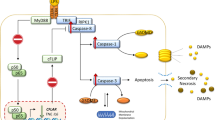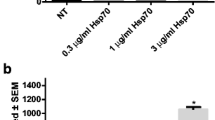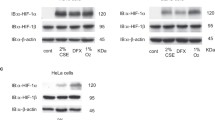Abstract
Cigarette smoke is a major risk factor for chronic obstructive pulmonary disease (COPD), leading to chronic inflammation, while bacterial components lipopolysaccharide (LPS) and lipoteichoic acid (LTA) are often present in airways of COPD patients, especially during exacerbations.
We hypothesised that extracellular heat shock protein 70 (eHsp70), a damage-associated molecular pattern elevated in serum of COPD patients, induces inflammation and alters cigarette smoke and LPS/LTA-induced inflammatory effects in the airway epithelium.
We used 16HBE cells exposed to recombinant human (rh)Hsp70 and its combinations with cigarette smoke extract (CSE), LPS or LTA to investigate those assumptions, and we determined pro-inflammatory cytokines’ secretion as well as TLR2 and TLR4 gene expression.
rhHsp70 and CSE alone stimulated IL-6, IL-8 and TNF-α secretion. CSE and rhHsp70 had antagonistic effect on IL-6 secretion, while combinations of LPS or LTA with rhHsp70 showed antagonistic effect on TNF-α release. By using specific inhibitors, we demonstrated that effects of rhHsp70 on cytokines’ secretion were mediated via NF-κB and/or MAPK signalling pathways. rhHsp70 increased, and CSE decreased TLR2 gene expression compared to untreated cells, but their combinations increased it compared to CSE alone. LPS and rhHsp70 combinations decreased TLR2 gene expression compared to untreated cells. TLR4 expression was not induced by any of the treatments.
In conclusion, we demonstrated that extracellular Hsp70 modulates pro-inflammatory responses of human airway epithelial cells to cigarette smoke and bacterial components LPS and LTA. Simultaneous presence of those compounds and their interactions might lead to inappropriate immune responses and adverse consequences in COPD.





Similar content being viewed by others
References
Adamson JEL, Phillips GDM (2011) In Vitro Models of Chronic Obstructive Pulmonary Disease (COPD), in: MartÃn-Loeches, I. (Ed.), Bronchitis. In Tech, pp. 41–66. https://doi.org/10.5772/18247
Alpizar YA, Boonen B, Sanchez A, Jung C, López-Requena A, Naert R, Steelant B, Luyts K, Plata C, De Vooght V, Vanoirbeek JAJ, Meseguer VM, Voets T, Alvarez JL, Hellings PW, Hoet PHM, Nemery B, Valverde MA, Talavera K (2017) TRPV4 activation triggers protective responses to bacterial lipopolysaccharides in airway epithelial cells. Nat Commun 8:1059. https://doi.org/10.1038/s41467-017-01201-3
Barnes PJ (2014) Cellular and molecular mechanisms of chronic obstructive pulmonary disease. Clin Chest Med 35:71–86. https://doi.org/10.1016/j.ccm.2013.10.004
Boonen B, Alpizar YA, Meseguer VM, Talavera K (2018) TRP channels as sensors of bacterial endotoxins. Toxins (basel) 10:326. https://doi.org/10.3390/toxins10080326
Callaghan PJ, Ferrick B, Rybakovsky E, Thomas S, Mullin JM (2020) Epithelial barrier function properties of the 16HBE14o- human bronchial epithelial cell culture model. Biosci Rep 40. 10.1042/BSR20201532
Cozens AL, Yezzi MJ, Kunzelmann K, Ohrui T, Chin L, Eng K, Finkbeiner WE, Widdicombe JH, Gruenert DC (1994) CFTR expression and chloride secretion in polarized immortal human bronchial epithelial cells. Am J Respir Cell Mol Biol 10:38–47. https://doi.org/10.1165/ajrcmb.10.1.7507342
Cui X, Xing J, Liu Y, Zhou Y, Luo X, Zhang Z, Han W, Wu T, Chen W (2015) COPD and levels of Hsp70 (HSPA1A) and Hsp27 (HSPB1) in plasma and lymphocytes among coal workers: a case-control study. Cell Stress Chaperones 20(3):473–481. https://doi.org/10.1007/s12192-015-0572-5
Dong J, Guo L, Liao Z, Zhang M, Zhang M, Wang T, Chen L, Xu D, Feng Y, Wen F (2013) Increased expression of heat shock protein 70 in chronic obstructive pulmonary disease. Int Immunopharmacol 17:885–893. https://doi.org/10.1016/j.intimp.2013.09.003
Giuliano JS, Lahni PM, Wong HR, Wheeler D (2011) Extracellular Heat Shock Proteins: Alarmins for the Host Immune System. Open Inflamm J 4:49–60. https://doi.org/10.2174/1875041901104010049
GOLD (2022) Gold 2022, Global Initiative For Chronic Obstructive Lung Disease.
Guillott L, Medjane S, Le-Barillec K, Balloy V, Danel C, Chignard M, Si-Tahar M (2004) Response of human pulmonary epithelial cells to lipopolysaccharide involves toll-like receptor 4 (TLR4)-dependent signaling pathways: Evidence for an intracellular compartmentalization of TLR4. J Biol Chem 279:2712–2718. https://doi.org/10.1074/jbc.M305790200
Heijink IH, Brandenburg SM, Noordhoek JA, Postma DS, Slebos DJ, Van Oosterhout AJM (2010) Characterisation of cell adhesion in airway epithelial cell types using electric cell-substrate impedance sensing. Eur Respir J 35:894–903. https://doi.org/10.1183/09031936.00065809
Hlapčić I, Hulina-Tomašković A, Grdić Rajković M, Popović-Grle S, Vukić Dugac A, Rumora L (2020) Association of Plasma Heat Shock Protein 70 with Disease Severity, Smoking and Lung Function of Patients with Chronic Obstructive Pulmonary Disease. J Clin Med 9:3097. https://doi.org/10.3390/jcm9103097
Hulina A, Grdić Rajković M, Jakšić Despot D, Jelić D, Dojder A, Čepelak I, Rumora L (2018) Extracellular Hsp70 induces inflammation and modulates LPS/LTA-stimulated inflammatory response in THP-1 cells. Cell Stress Chaperones 23:373–384. https://doi.org/10.1007/s12192-017-0847-0
Hulina-Tomašković A, Grdić Rajković M, Jelić D, Bosnar M, Sladovljev L, ŽanićGrubišić T, Rumora L (2019) Pro-inflammatory effects of extracellular Hsp70 on NCI-H292 human bronchial epithelial cell line. Int J Exp Pathol 100:320–329. https://doi.org/10.1111/iep.12335
Hulina-Tomašković A, Heijink IH, Jonker MR, Somborac-Bačura A, GrdićRajković M, Rumora L (2019) Pro-inflammatory effects of extracellular Hsp70 and cigarette smoke in primary airway epithelial cells from COPD patients. Biochimie 156:47–58. https://doi.org/10.1016/j.biochi.2018.09.010
Hulina-Tomašković A, Somborac-Bačura A, GrdićRajković M, Bosnar M, Samaržija M, Rumora L (2019) Effects of extracellular Hsp70 and cigarette smoke on differentiated THP-1 cells and human monocyte-derived macrophages. Mol Immunol 111:53–63. https://doi.org/10.1016/j.molimm.2019.04.002
Kamal R, Srivastava AK, Kesavachandran CN (2015) Meta-analysis approach to study the prevalence of chronic obstructive pulmonary disease among current, former and non-smokers. Toxicol Reports 2:1064–1074. https://doi.org/10.1016/j.toxrep.2015.07.013
Krause M, Heck TG, Bittencourt A, Scomazzon SP, Newsholme P, Curi R, Homem De Bittencourt PI (2015) The chaperone balance hypothesis: The importance of the extracellular to intracellular HSP70 ratio to inflammation-driven type 2 diabetes, the effect of exercise, and the implications for clinical management. Mediators Inflamm 2015:249205. https://doi.org/10.1155/2015/249205
Leung JM, Tiew PY, Mac Aogáin M, Budden KF, Yong VFL, Thomas SS, Pethe K, Hansbro PM, Chotirmall SH (2017) The role of acute and chronic respiratory colonization and infections in the pathogenesis of COPD. Respirology 22:634–650. https://doi.org/10.1111/resp.13032
Li CJ, Ning W, Matthay MA, Feghali-Bostwick CA, Choi AMK (2007) MAPK pathway mediates EGR-1-HSP70-dependent cigarette smoke-induced chemokine production. Am J Physiol - Lung Cell Mol Physiol 292:L1297–L1303. https://doi.org/10.1152/ajplung.00194.2006
Li D, Wang J, Sun D, Gong X, Jiang H, Shu J, Wang Z, Long Z, Chen Y, Zhang Z, Yuan L, Guan R, Liang X, Li Z, Yao H, Zhong N, Lu W (2018) Tanshinone IIA sulfonate protects against cigarette smoke-induced COPD and down-regulation of CFTR in mice. Sci Rep 8:376. https://doi.org/10.1038/s41598-017-18745-5
Liu G, Wan Q, Li J, Hu X, Gu X, Xu S (2020) Circ_0038467 regulates lipopolysaccharide-induced inflammatory injury in human bronchial epithelial cells through sponging miR-338-3p. Thorac Cancer 11:1297–1308. https://doi.org/10.1111/1759-7714.13397
Moreira Santos TM, Godoy I, Castro Marconades JP, Tanni Minamoto SE, Garcia T, Godoy I (2017) The change of heat shock protein in tobacco users and clinical and laboratory characteristics as markers to evaluate the pathophysiological process promoted by cigarette. Eur Respir J 50:OA4825. https://doi.org/10.1183/1393003.congress-2017.OA4825
Muir A, Soong G, Sokol S, Reddy B, Gomez MI, Van Heeckeren A, Prince A (2004) Toll-like receptors in normal and cystic fibrosis airway epithelial cells. Am J Respir Cell Mol Biol 30:777–783. https://doi.org/10.1165/rcmb.2003-0329OC
Njemini R, Lambert M, Demanet C, Mets T (2003) Elevated Serum Heat-Shock Protein 70 Levels in Patients with Acute Infection: Use of an Optimized Enzyme-Linked Immunosorbent Assay. Scand J Immunol 58:664–669. https://doi.org/10.1111/j.1365-3083.2003.01341.x
Pace E, Ferraro M, Siena L, Scafidi V, Gerbino S, Di Vincenzo S, Gallina S, Lanata L, Gjomarkaj M (2013) Carbocysteine regulates innate immune responses and senescence processes in cigarette smoke stimulated bronchial epithelial cells. Toxicol Lett 223:198–204. https://doi.org/10.1016/j.toxlet.2013.09.013
Patel IS, Seemungal TAR, Wilks M, Lloyd-Owen SJ, Donaldson GC, Wedzicha JA (2002) Relationship between bacterial colonisation and the frequency, character, and severity of COPD exacerbations. Thorax 57:759–764. https://doi.org/10.1136/thorax.57.9.759
Qu B, Jia Y, Liu Y, Wang H, Ren G, Wang H (2015) The detection and role of heat shock protein 70 in various nondisease conditions and disease conditions: a literature review. Cell Stress Chaperones. https://doi.org/10.1007/s12192-015-0618-8
Rio DC, Ares M, Hannon GJ, Nilsen TW (2010) Purification of RNA using TRIzol (TRI Reagent). Cold Spring Harb Protoc 5:1–4. https://doi.org/10.1101/pdb.prot5439
Rumora L, Milevoj L, Popović-Grle S, Barišić K, Grubišić TŽ, Čepelak I (2008) Reduction in peripheral blood leukocyte heat shock proteins 27 and 70 expression in chronic obstructive pulmonary disease. Croat Chem Acta 81:73–80
Šegvić Klarić M, Medić N, Hulina A, Žanić Grubišić T, Rumora L (2014) Disturbed Hsp70 and Hsp27 expression and thiol redox status in porcine kidney PK15 cells provoked by individual and combined ochratoxin A and citrinin treatments. Food Chem Toxicol 71:97–105. https://doi.org/10.1016/j.fct.2014.06.002
Somborac-Bačura A, Popović-Grle S, Zovko V, Žanić-Grubišić T (2018) Cigarette Smoke Induces Activation of Polymorphonuclear Leukocytes. Lung 196:27–31. https://doi.org/10.1007/s00408-017-0077-3
Somensi N, Brum PO, De Miranda Ramos V, Gasparotto J, Zanotto-Filho A, Rostirolla DC, Da Silva Morrone M, Moreira JCF, Gelain DP (2017) Extracellular HSP70 Activates ERK1/2, NF-κB and Pro-Inflammatory Gene Transcription Through Binding with RAGE in A549 Human Lung Cancer Cells. Cell Physiol Biochem 42:2507–2522. https://doi.org/10.1159/000480213
Sun J, Huang N, Ma W, Zhou H, Lai K (2019) Protective effects of metformin on lipopolysaccharide-induced airway epithelial cell injury via NF-κB signaling inhibition. Mol Med Rep 19:1817–1823. https://doi.org/10.3892/mmr.2019.9807
Sun X, Feng X, Zheng D, Li A, Li C, Li S, Zhao Z (2019) Ergosterol attenuates cigarette smoke extract-induced COPD by modulating inflammation, oxidative stress and apoptosis in vitro and in vivo. Clin Sci (lond) 133:1523–1536. https://doi.org/10.1042/CS20190331
Vallese D, Ricciardolo FLM, Gnemmi I, Casolari P, Brun P, Sorbello V, Capelli A, Cappello F, Cavallesco GN, Papi A, Chung KF, Balbi B, Adcock IM, Caramori G, Di Stefano A (2015) Phospho-p38 MAPK expression in COPD patients and asthmatics and in challenged bronchial epithelium. Respiration 89:329–342. https://doi.org/10.1159/000375168
Vanella L, Li Volti G, Distefano A, Raffaele M, Zingales V, Avola R, Tibullo D, Barbagallo I (2017) A new antioxidant formulation reduces the apoptotic and damaging effect of cigarette smoke extract on human bronchial epithelial cells. Eur Rev Med Pharmacol Sci 21:5478–84. https://doi.org/10.26355/eurrev_201712_13938
Wang H, Xing J, Wang F, Han W, Ren H, Wu T, Chen W (2010) Expression of Hsp27 and Hsp70 in lymphocytes and plasma in healthy workers and coal miners with lung cancer. J Huazhong Univ Sci Technolog Med Sci 30(4):415–420. https://doi.org/10.1007/s11596-010-0441-5
West KA, Brognard J, Clark AS, Linnoila IR, Yang X, Swain SM, Harris C, Belinsky S, Dennis PA (2003) Rapid Akt activation by nicotine and a tobacco carcinogen modulates the phenotype of normal human airway epithelial cells. J Clin Invest 111:81–90. https://doi.org/10.1172/JCI200316147
Wu D, Yuan Y, Lin Z, Lai T, Chen M, Li W, Lv Q, Yuan B, Li D, Wu B (2016) Cigarette smoke extract induces placental growth factor release from human bronchial epithelial cells via ROS/MAPK (ERK-1/2)/Egr-1 axis. Int J COPD 11:3031–3042. https://doi.org/10.2147/COPD.S120849
Yao H, Sun Y, Song S, Qi Y, Tao X, Xu L, Yin L, Han X, Xu Y, Li H, Sun H, Peng J (2017) Protective Effects of Dioscin against Lipopolysaccharide-Induced Acute Lung Injury through Inhibition of Oxidative Stress and Inflammation. Front Pharmacol 8:120. https://doi.org/10.3389/fphar.2017.00120
Zhang C, Qin S, Qin L, Liu L, Sun W, Li X, Li N, Wu R, Wang X (2016) Cigarette smoke extract-induced p120-mediated NF-ΰ B activation in human epithelial cells is dependent on the RhoA/ROCK pathway. Sci Rep 6:23131. https://doi.org/10.1038/srep23131
Zuo L, Lucas K, Fortuna CA, Chuang C-C, Best TM (2015) Molecular Regulation of Toll-like Receptors in Asthma and COPD. Front Physiol 6:312. https://doi.org/10.3389/fphys.2015.00312
Acknowledgements
This work has been fully supported by the Croatian Science Foundation under the project number IP-2014-09-1247.
This work has been supported in part by project Strengthening the scientific research and innovation capacities of the Faculty of Pharmacy and Biochemistry, University of Zagreb (FarmInova; project number KK.01.1.1.02.0021), financed from the European Regional Development Fund, Operational Program Competitiveness and Cohesion for the period 2014-2020.
The work of PhD student Iva Hlapčić has been fully supported by the “Young researchers' career development project – training of doctoral students” of the Croatian Science Foundation funded by the European Union from the European Social Fund.
Andrea Hulina-Tomašković is recipient of a European Respiratory Society Fellowship (STRTF 2015).
Author information
Authors and Affiliations
Corresponding author
Ethics declarations
Conflict of interest
The authors declare that they have no conflict of interest.
Additional information
Publisher's note
Springer Nature remains neutral with regard to jurisdictional claims in published maps and institutional affiliations.
Rights and permissions
Springer Nature or its licensor holds exclusive rights to this article under a publishing agreement with the author(s) or other rightsholder(s); author self-archiving of the accepted manuscript version of this article is solely governed by the terms of such publishing agreement and applicable law.
About this article
Cite this article
Hulina-Tomašković, A., Somborac-Bačura, A., Grdić Rajković, M. et al. Extracellular Hsp70 modulates 16HBE cells' inflammatory responses to cigarette smoke and bacterial components lipopolysaccharide and lipoteichoic acid. Cell Stress and Chaperones 27, 587–597 (2022). https://doi.org/10.1007/s12192-022-01294-w
Received:
Revised:
Accepted:
Published:
Issue Date:
DOI: https://doi.org/10.1007/s12192-022-01294-w




